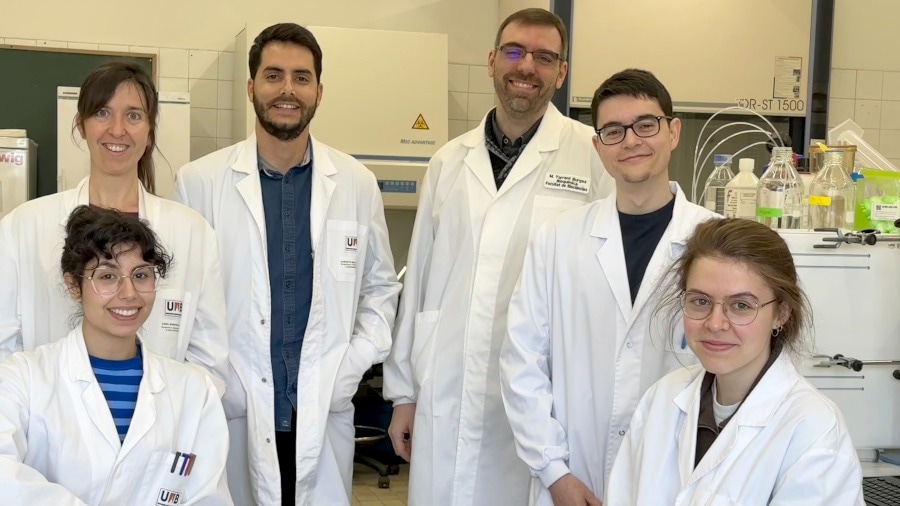Reviewed by Lexie CornerJun 5 2025
A research team led by the Universitat Autònoma de Barcelona (UAB) has identified a new type of antimicrobial peptide (AMP) found in human proteins. This peptide may be able to selectively target and eliminate multidrug-resistant bacteria, especially gram-negative strains that are a common cause of serious hospital-acquired infections.
 Marc Torrent Burgas and Roberto Bello Madruga (third and fourth from the right, respectively) with the rest of the research team: Carmen Mesas Vaz, Enea Sancho Vaello, Jordi Gómez Borrego, and Alba Guembe Mülberger. Image Credit: Universitat Autònoma de Barcelona
Marc Torrent Burgas and Roberto Bello Madruga (third and fourth from the right, respectively) with the rest of the research team: Carmen Mesas Vaz, Enea Sancho Vaello, Jordi Gómez Borrego, and Alba Guembe Mülberger. Image Credit: Universitat Autònoma de Barcelona
The study, published in Molecular Systems Biology, could contribute to the development of more effective treatments for infections that do not respond to conventional antibiotics.
The researchers focused on a group of proteins known as glycosaminoglycan-binding proteins (HBPs), which are typically involved in blood clotting and inflammation. Using computational tools, the team analyzed more than one hundred of these proteins to identify potential antimicrobial activity.
The research is based on a curious observation. Certain proteins of our bodies that bind to heparin, a molecule regulating processes such as blood clotting and inflammation, can also recognise similar structures found on the surface of dangerous bacteria.
Marc Torrent, Researcher and Study Coordinator, Department of Biochemistry and Molecular Biology, Universitat Autònoma de Barcelona
Building on this concept, the researchers identified and synthesized fragments of the proteins with antimicrobial potential.
Out of the candidates tested, five lab-synthesized peptides showed strong activity against gram-negative bacteria, including Escherichia coli, Pseudomonas aeruginosa, and Acinetobacter baumannii - all major causes of hospital-acquired infections.
One peptide, called HBP-5, was especially promising. In addition to effectively killing bacteria at low concentrations in laboratory tests, HBP-5 significantly reduced bacterial levels in multiple organs in a mouse model of sepsis.
Torrent added, “These peptides stand out for their potency and specificity, with a very low toxicity in human cells, indicating that they could be safe as a basis for future treatments. This opens the door to a new family of antibiotics derived from the body’s own proteins, with the advantage that they can act specifically against resistant bacteria without affecting healthy cells.”
Source:
Journal reference:
Bello-Madruga, R., et al. (2025) Mining the heparinome for cryptic antimicrobial peptides that selectively kill Gram-negative bacteria. Molecular Systems Biology. doi.org/10.1038/s44320-025-00120-6.